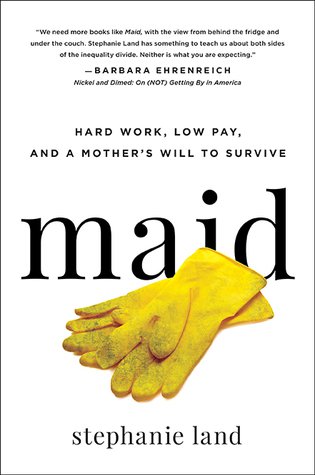 The next First Thursday Book Discussion will be December 7, from 12-1 p.m. at the Columbia Public Library. The featured book will be “Maid: Hard Work, Low Pay and a Mother’s Will to Survive,” by Stephanie Land.
The next First Thursday Book Discussion will be December 7, from 12-1 p.m. at the Columbia Public Library. The featured book will be “Maid: Hard Work, Low Pay and a Mother’s Will to Survive,” by Stephanie Land.
37.9 million. That’s the number of people living in poverty in the U.S. in 2022*.
37.9 million. My brain can’t make much meaning out of that number. It’s really big. It’s more than one in ten people in our country. Just as it’s hard to understand really large numbers, I think it is hard, nearing impossible, to understand what it is like to live in poverty unless you’ve been there.
That’s one reason that Stephanie Land’s debut book, “Maid: Hard Work, Low Pay and a Mother’s Will to Survive,” is such a gift. By sharing her story, Land provides a rare glimpse into the life of a single mother living below the poverty line. Land’s family was hit hard by the 2008 recession, leaving her with almost no support from family when she became pregnant after graduating from high school. While parts of the Pacific Northwest are associated with wealth and affluence, many individuals — such as Land — are experiencing the impacts of generational poverty that dates back to one of many economic crises such as the 2008 Recession, the collapse of the logging industry or even the Great Depression.
Land’s clear, frank writing illustrates heartbreaking struggles, inequities and ultimately a breakthrough opportunity. Before I read the book, I felt like it was a book I should read — and it is a book that more people should read — but it’s also a really good book. Whether it was navigating bureaucratic mazes, seeking medical help from callous doctors, or joyfully sledding with her daughter, Land’s narrative pulls the reader along to share in her experiences.
Despite, Land’s bold presentation of her reality, she leaves room for readers to draw their own conclusions about economic policy or social conventions. Land pulls back the curtain to show you the situation without preaching or commanding.
Land received support for the development of “Maid” from the non-profit Economic Hardship Reporting Project, which was founded by Barbara Ehrenreich, author of the 2001 book, “Nickel and Dimed: (Not) Getting by in America.” Ehrenreich wrote the introduction for “Maid.” If you read nothing else, read Ehrenreich’s introduction — it will be worth it. However, once you get started, you’ll want to read the whole book.
Ehrenreich was having lunch more than 20 years ago, discussing future writing projects when the conversation drifted and she wondered how anyone survives on minimum wage. Some journalist should find out, she thought. Ehrenreich decided she was that journalist and spent a year working at a series of jobs earning $7 an hour. The resulting book, “Nickel and Dimed: (Not) Getting by in America,” is the most well-known of Ehrenreich’s more than 20 published books. Her experiences working at minimum wage inspired her to found the Economic Hardship Reporting Project, whose mission is to support independent reporting on under-reported stories of hardship — especially stories by those who have lived the hardship — stories by people like Land.
Readers of “Maid,” will likely be interested in Land’s second book. “Class: A Memoir of Motherhood, Hunger and Higher Education,” picks up where “Maid” left off. Land works to finish her undergraduate degree and raise her daughter in a new town, surrounded by younger classmates, most of whom are supported to some extent by their families.
Come to the December 7 event to share your conclusions, impressions and questions, and to hear from other community members in a facilitated conversation about “Maid.”
*This figure is from the U.S. Census, which puts the poverty level at $20,172 for a household with one parent and one child.


